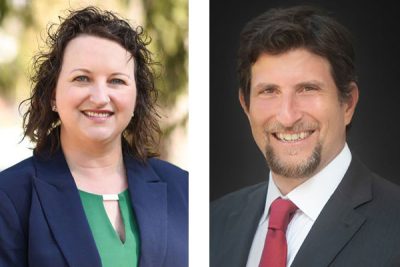Hildenbrand, McCall Renew Some of Last Year’s Debate in New Castle
News Based on facts, either observed and verified directly by the reporter, or reported and verified from knowledgeable sources.

Last year’s New Castle Town Board elections turned out to be a referendum on the merits and demerits of the controversial Form Based Code that would have altered the zoning in the heart of downtown Chappaqua.
While that proposal has been apparently relegated to history, the tension that flowed in torrents last fall, still runs deep between Unite New Castle and its supporters and the town’s Democratic Committee. Over the past month a one-seat special Town Board election next week has renewed some of last year’s animosities.
Councilman Christian Hildenbrand, who was appointed in January two months after United New Castle’s four-seat sweep last November, faces the 2021 defeated Democratic supervisor nominee Holly McCall. The winner will serve the remaining three years of what would have been Andrea Sanseverino Galan’s Town Board term. She announced during the 2021 general election campaign she would be moving from New Castle.
After his appointment, Hildenbrand said he wasn’t certain whether he would run for the balance of the term, but figured if he enjoyed the work and could help the town it would only be fair to the ticket’s supporters to compete for the three remaining years.
“I was sort of getting my feet under me and making sure that I felt like this is something I wanted to continue,” Hildenbrand said.
McCall, who had served a term on the Chappaqua Board of Education before running, said she wanted to continue her public service and wasn’t deterred by last year’s defeat.
“I have something to offer the community, especially now as there is a very single-minded majority (on the Town Board),” McCall said. “Having more diversity of thought and perspective and evenness on the board is important.”
What hasn’t changed during the past year are the different approaches for downtown Chappaqua. Hildenbrand said he favors measured and incremental improvements rather than radically changing its character. That decision has already paid dividends with several new restaurants and businesses having moved in this year, refreshing the downtown, he said.
“The fact that they’re taking that chance in our town, to me is just the greatest statement of all that the town never was dead, never was dying,” Hildenbrand said of the new merchants.
Other steps for the town to consider is hosting more events with the Recreation Department and music, which will increase foot traffic at certain times of year, he said.
But McCall said most of the changes during the past year have been “one-offs,” with no articulated goals for the future. She would favor bringing the community together – not necessarily formal charrettes since that would be for public land – but forums that help shape the future direction of the town.
“We have spent a lot of time and money as a community, as a town on master plans,” she said. “Despite the fact that the Form Based Code is dead, there was a useful bit of learning that happened, about what people don’t want, in particular. So I think we need to finish the conversation.”
For North Greeley Avenue, which needs the most help, McCall said, she would work toward reaching consensus on a type of policy or zoning to set that stretch up for success rather than reacting to each proposal in isolation.
The preliminary mixed-use proposal for the old Rite Aid property, should be returning to the town, Hildenbrand said. He called it an intriguing proposal that would provide a different type of housing for a property that needs to be improved.
Hildenbrand said he wouldn’t object having some select underutilized parcels in town discussed for development as long as they provide benefits such as additional housing, community space and restaurants and retail.
Millwood must also be a greater focus on the town’s radar, McCall said. Completing the sidewalk project for the hamlet’s center is important while the town should continue exploring funding for sewers.
She would like the town to look at its parking in downtown Chappaqua because the shift in commuting patterns has left the train station parking lot underutilized.
Both candidates would work toward more walkability for New Castle. At $10 million, the proposed ChapLine linking the area near Chappaqua Crossing with downtown is expensive. Therefore, Hildenbrand said the town should also work with the Recreation Department to maintain and enhance trails. He also supports exploring the connection of Millwood and Gedney Park with sidewalks.
McCall said given the ChapLine’s expense, it might be more beneficial to look at other sidewalk projects if significant grants cannot be obtained. She would also like to explore other recreation opportunities including more basketball facilities for children and possibilities for a town pool.
“I think there’s a way that we could explore bringing the community together now and become inclusive,” McCall said of a pool.
Hildenbrand said the town must stay on top of the county’s ongoing airport Master Plan process and how it would affect the town. The board has also done a good job at filling advisory board vacancies.
“I think tapping that reservoir of resident expertise and engagement will continue to be a focus,” Hildenbrand said.

Martin has more than 30 years experience covering local news in Westchester and Putnam counties, including a frequent focus on zoning and planning issues. He has been editor-in-chief of The Examiner since its inception in 2007. Read more from Martin’s editor-author bio here. Read Martin’s archived work here: https://www.theexaminernews.com/author/martin-wilbur2007/
